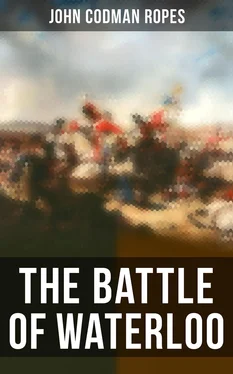Napoleon25 says of his officers at this period:—
“The character of several of the generals had been weakened by the events of 1814; they had lost something of that audacity, of that resolution, of that confidence, which had * * * contributed so much to the successes of former campaigns.”26
Charras has a passage to the same effect:27—
“Enriched, systematically corrupted, by the prodigality of the Empire; enervated by luxury and pleasure; fatigued by twenty years of war, several among the generals would have preferred the tranquil life of their own homes to the labors of the march and the discomforts of the bivouac. They had tasted of peace for a whole year; they looked back on that period with regret. Some among them had met with rude defeats while in independent commands, and they remembered them well. Others, shaken by the cruel recollections of 1813 and 1814, despaired of the issue of the war in view of the enormous armies of the coalition and of the feebleness of our means of defence. All remained brave, intrepid; but all had not preserved the activity, the resolution, the audacity of their early days. Their moral was no longer equal to sustaining a reverse.”
These statements may very possibly be somewhat too highly colored, but there is little doubt that there was a good deal of truth in them. It is significant that they are made by writers who wrote of the campaign from opposite points of view. Napoleon in his narrative of the campaign sought to show that he was not the sole or even the chief cause of its failure, and claimed that his orders were not carried out with the spirit and energy which his lieutenants had once possessed. Charras on the other hand, throughout his history, is uniformly harsh in his comments on the Emperor’s conduct, and insists that he was greatly lacking both in physical strength and in energy of character. That both Charras and Napoleon, therefore, state that the higher officers of the army were not up to the mark of their earlier campaigns renders it very probable that such was the actual fact.
The importance of this fact is to be seen in its true light only when we bear in mind to how great an extent Napoleon’s campaigns required for their successful conduct qualities in his lieutenants by no means universally found even in respectable corps-commanders,—qualities far in excess of those commonly demanded. Napoleon was not content with mere obedience; he expected from his chief officers an intelligent comprehension of his views, and a vigorous and daring execution of the parts assigned to them,—a sort of coöperation, in fact. The movements with which the campaign of 1809 opened will best illustrate, perhaps, what is here referred to. It is not too much to say that without this hearty and intelligent work on the part of his lieutenants many of Napoleon’s most brilliant and successful campaigns could never have been carried out. We shall see in the course of this narrative how much he expected from Ney and Grouchy. Hence any inability or unwillingness on the part of the leading officers to render this assistance must be fully taken into account when we are seeking to understand this campaign of Waterloo.
We have not spoken of the commander of the Guard, Marshal Mortier, because he was taken ill just before the opening of the campaign, and no one replaced him. General Drouot, an artillery officer of great merit, was the adjutant-general of the Guard, and orders were given through him.
At the last moment, on the eve of the opening of hostilities, the Emperor sent for Marshal Ney. Why the orders to this distinguished officer were not given earlier, we are not informed; it seems like an unpardonable oversight, to say the least. As such Ney certainly regarded it.28 Ney was given no time for preparation; it was only by the exercise of great diligence that he reached the front when he did, and that was at five o’clock in the afternoon of the 15th, after the Sambre had been crossed. He was assigned to the command of the 1st and 2d Corps, commanded by the Counts d’Erlon and Reille respectively; but he was ignorant of their organization, and had even to learn the names of the division commanders. It is difficult, if not impossible, to understand this strange neglect of Napoleon. No one knew better than he how important it is that the commander of an army or of a wing of an army should have ample time to know his troops and to be known by them, and that this was especially necessary where a reorganization had recently taken place.
In the army, thus constituted, there were, then, three Marshals. Of these, one, Soult, was serving in a new capacity for him, that of chief-of-staff; another, Ney, had not been given a fair chance to get a good hold on the troops assigned to him; the third, Grouchy, was not a man of superior capacity, had never commanded an army-corps in his life, and had only just been made a Marshal. Grouchy was at first assigned to the command of the reserve cavalry, consisting of the four cavalry corps of Pajol, Exelmans, Kellermann and Milhaud, numbering in all 13,784 men. But the campaign had scarcely opened when he was relieved from this duty, and placed in command of the right wing of the army, consisting of the 3d and 4th Corps, those of Generals Vandamme and Gérard, together with a considerable force of cavalry. Here again was a singular neglect on Napoleon’s part of the importance of allowing the new Marshal time to get used to his new duties; and, as we shall ultimately have occasion to see, this circumstance operated most unfavorably when Grouchy found himself in an independent command. It looks very much as if Napoleon only decided to send for Ney at the last minute, and as if the assignment of Grouchy to the command of the two corps of Vandamme and Gérard was not determined on until the campaign had opened.
But not only was the organization of the army not as perfect as it might have been by reason of the course which Napoleon pursued in regard to Ney and Grouchy; there was an officer whom he ordered to stay behind when he might have had him with himself as well as not, a man of the highest reputation, the Duke of Auërstadt, the Prince of Eckmühl, Marshal Davout. The Emperor had made him Minister of War, but Davout begged to have a command in the field. He represented to the Emperor,—29
“That the defence of Paris, notwithstanding its incontestable importance, was, like all questions of interior defence, only secondary, and essentially subordinate to the result of military operations; that when it was a question of playing a decisive part on the field of battle, it was not the time to make experiments with new men; that it was necessary, on the contrary, for the Emperor to surround himself with men who had given good account of themselves and who had had long experience in high command. The Marshal did not succeed in convincing the Emperor, who contented himself with replying: ‘I cannot entrust Paris to any one else.’ ‘But, sire,’ replied Davout, ‘if you are the victor, Paris will be yours; and if you are beaten, neither I nor any one else can do anything for you.’”
There can be no question that the Marshal’s reasoning was sound; but Napoleon persisted in his course. What he lost by not having Davout with him in this campaign, it is not easy to estimate; it is perhaps foolish to conjecture. But it would probably not be going too far to say that Davout in the place of either Ney or Grouchy would have prevented the catastrophe of Waterloo.
This sketch of the personnel of the French army naturally leads up to an estimate of its chief, that is, of his comparative fitness at this period of his life to undertake the tasks of such a daring, laborious and perilous campaign as this attack on Blücher and Wellington was sure to prove.
Most historians have agreed that in point of bodily activity the Emperor did not show himself in this campaign the equal of his former self; in fact, most writers have gone farther than this; they have attributed to him a lassitude of mind as well as of body, they have found a want of the mental activity and a lack of the resolute will, which had been so characteristic of him in his earlier days. The portrait of Napoleon by General Foy is one of the best we have, and is of especial value as having been drawn by a contemporary, who served throughout his wars and commanded a division at Waterloo.
Читать дальше












